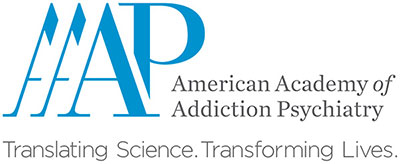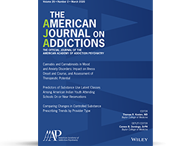Continuing Certification (CC/MOC) for ABPN Diplomates
All American Board of Psychiatry and Neurology (ABPN) board certified psychiatrists need to fulfill Continuing Certification (CC), formerly MOC, requirements. These requirements consist of four parts:
- Professionalism and Professional Standing
To show evidence of professional standing, all Diplomats must continuously hold an active, full, and unrestricted allopathic and/or osteopathic license to practice medicine. Career opportunities. - Lifelong Learning and Self-Assessment Continuing Medical Education Requirements (CMEs) and Continuing Education Activities
The American Academy of Addiction Psychiatry (AAAP) is committed to providing members with lifelong learning and training opportunities through an array of Professional Development programs and activities. View a list of all AAAP’s continuing education activities. - Assessment of Knowledge and Skills
The ABPN administers board examinations to certify or re-certify practicing psychiatrists. View the upcoming exam dates. Diplomates can now participate in the optional Article-Based Continuing Certification (ABCC) Pathway for all ABPN-administered primary and subspecialty certifications in lieu of taking the traditional 10-Year recertification examination. View the information about the new ABPN ABCC Pathway. - Improvement in Medical Practice (PIP)
Performance in Practice (PIP) is designed for clinically active physicians to promote practice improvement activities through either a chart review module or a feedback module. One PIP unit should be completed every three years. For a full description, visit ABPN’s website. AAAP has developed a Cannabis Use Disorder PIP, Tobacco PIP, Alcohol Use Disorders PIP, and Motivational Interviewing PIP. AAAP also lists the Opioid Use Disorder PIP developed by PCSS, and the Stimulant Use Disorder PIP developed by ORN. Both the PCSS and ORN PIPs are free to all. Learn more
ABPN no longer accepts CME credit reporting for non-self-assessment and non-PIP activities. Your AAAP CME certificate(s) and/or transcript can be used should you need to provide proof of CME credit earned.
MOL for Healthcare Professionals
Physicians and health care professionals can maintain their licenses by obtaining credit through participation in a variety of AAAP activities. View a list of all AAAP’s continuing education activities.
Continuing Professional Development
AAAP has been an accredited provider of continuing medical education since 2014. In December, 2018, AAAP was awarded joint accreditation from Joint Accreditation for Interprofessional Continuing Education (JAICE)™. Read the press release.

In support of improving patient care, American Academy of Addiction Psychiatry is jointly accredited by the Accreditation Council for Continuing Medical Education (ACCME), the Accreditation Council for Pharmacy Education (ACPE), and the American Nurses Credentialing Center (ANCC) to provide continuing education for the healthcare team.
In 2019, AAAP also added accreditation from The American Academy of PAs (AAPA), American Psychological Association (APA) and Association for Social Work Boards (ASWB).
Joint Accreditation for Interprofessional Continuing Education™ establishes the standards for education organizations to deliver continuing education planned by the healthcare team for the healthcare team and offers AAAP the ability to designate continuing education credits to physicians, nurses and pharmacists. The accreditation was awarded for six years, the maximum allowed by JAICE, and is current through November, 2024.
Jointly accredited providers are entitled to award Interprofessional Continuing Education (IPCE) credits. This innovation promotes interprofessional continuing education (IPCE) that leads to improved healthcare delivery and better patient outcomes, a tenet AAAP is passionate about. AAAP’s CPD program and educational activities meet rigorous standards for education, evidence-based medicine and scientific quality and independence.



